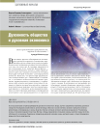Spirituality of Society and Spiritual Economy
DOI: https://doi.org/10.33917/es-2.176.2021.104-113
The article examines the history of the formation of spirituality in the East and West and examines modern problems of spirituality in society. The compatibility of the values of the West and the East is studied and the composition of the key laws and principles of the main religions of the world in the life of society is integrated. The combination of secular and religious spirituality is studied. The basics and provisions of labor ethics in the countries of the East and West are considered, and the attitude of the main religions to labor, wealth, property, and the economy is compiled. The definition of spiritual economy is proposed, and evaluation criteria are given, as well as an introductory composition of its characteristics is formed
References:
1. Frank S.L. Dukhovnye osnovy obshchestva [Spiritual Foundations of Society]. Moscow, Respublika, 1993.
2. Ozhegov S.I. Tolkovyi slovar’ russkogo yazyka [Explanatory dictionary of the Russian language]. Moscow, Mir i obrazovanie, 2017, 1376 p.
3. Ushakov D.N. Bol’shoi tolkovyi slovar’ russkogo yazyka. Sovremennaya redaktsiya [Great Dictionary of Russian language. Modern edition]. Moscow, Dom slavyanskoi knigi, 2017, 960 p.
4. Sukhomlinskii V.A. Kak vospitat’ nastoyashchego cheloveka [Как educate a real person]. Moscow, Pedagogika, 1990, 286 p.
5. Dal’ V.I. Tolkovyi slovar’ russkogo yazyka [Explanatory dictionary of the Russian language]. Moscow, AST, 2020, 448 p.
6. Berdyaev N.A. Dukh i real’nost’ [Spirit and reality]. Moscow, AST, AST Moskva, 2007, 276 p.
7. Yung K.G. Arkhetip i simvol [Archetype and symbol]. Moscow, Kanon, 2019, 336 p.
8. Leont’ev D.A. Dukhovnost’, samoregulyatsiya i tsennosti [Spirituality, self-regulation and values]. CYBERLENINKA, available at: https://cyberleninka.ru/article/n/9661530.
9. Dipak Chopra. Sem’ dukhovnykh zakonov uspekha [Seven Spiritual Laws of Success]. Mnogobook. Knigi onlain, available at: https://www.mnogobook.ru/nauka_obrazovanie/filosofiya/81797/fulltext.htm.
10. Sergeev A.G. Svetskie i dukhovnye vlastiteli Evropy [Secular and spiritual rulers of Europe]. Vol. 43. Moscow, Direkt-Media, 2005, 250 p.
11. Veber M. Protestantskaya etika i dukh kapitalizma [Protestant ethics and the spirit of capitalism]. Moscow, Progress, 1990, 219 p.
12. Zabaev I.V. Protestantskaya etika i dukh kapitalizma: “kritiki” Veberovskoi gipotezy 30–60-kh godov XX stoletiya [Protestant ethics and the spirit of capitalism: “Critics” of the Weberian hypothesis of the 30-60s of the XX century]. CYBERLENINKA, available at: https://cyberleninka.ru/article/n/protestantskaya-etika-i-duhkapitalizma-kritiki-veberovskoy-gipotezy-30-60-h-gg-xx-stoletiya.
13. G’yatso T., Katler G. Iskusstvo byt’ schastlivym na rabote [The art of being happy at work]. Sofiya, 2007, 336 p.
14. Perelomov L.S. Konfutsii: zhizn’, uchenie, sud’ba [Confucius: life, teaching, destiny]. Moscow, Nauka, 1993, 440 p.
15. Malyavin V.V. Tridtsat’ shest’ stratagem. Kitaiskie sekrety uspekha [Thirty-six stratagems. Chinese secrets of success]. Moscow, Belye al’vy, 2000, 192 p.
16. Pochemu v Rossii grazhdane ne poluchayut dokhod ot prirodnykh resursov, kak v drugikh stranakh? [Why don’t citizens in Russia receive income from natural resources, as in other countries?]. Yandeks Dzen, 2019, March, 14, available at: https://zen.yandex.ru/media/self_employed/pochemu-v-rossii-grajdanene-poluchaiut-dohod-ot-prirodnyh-resursov-kak-v-drugih-stranah-5c8a7381c35b2c00b3aeec71



